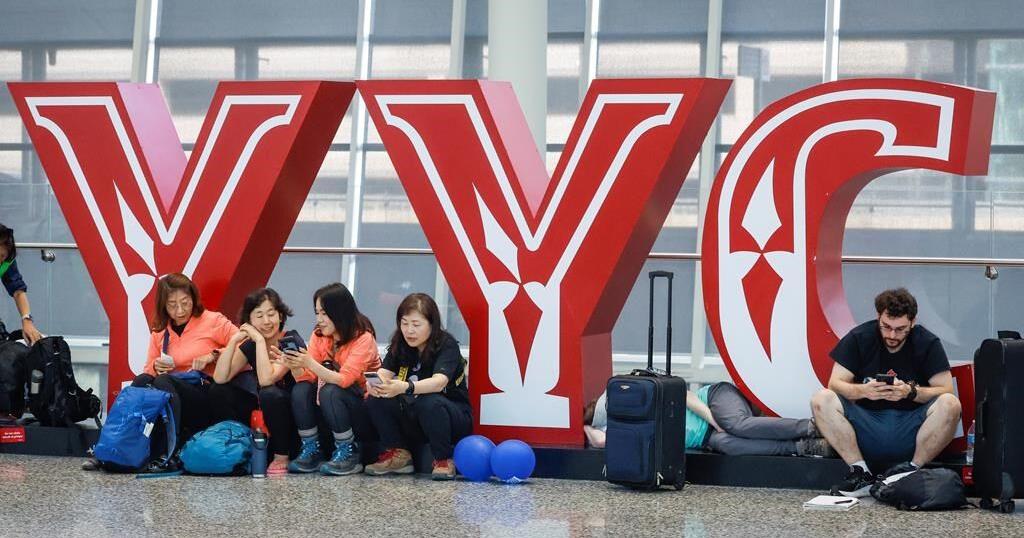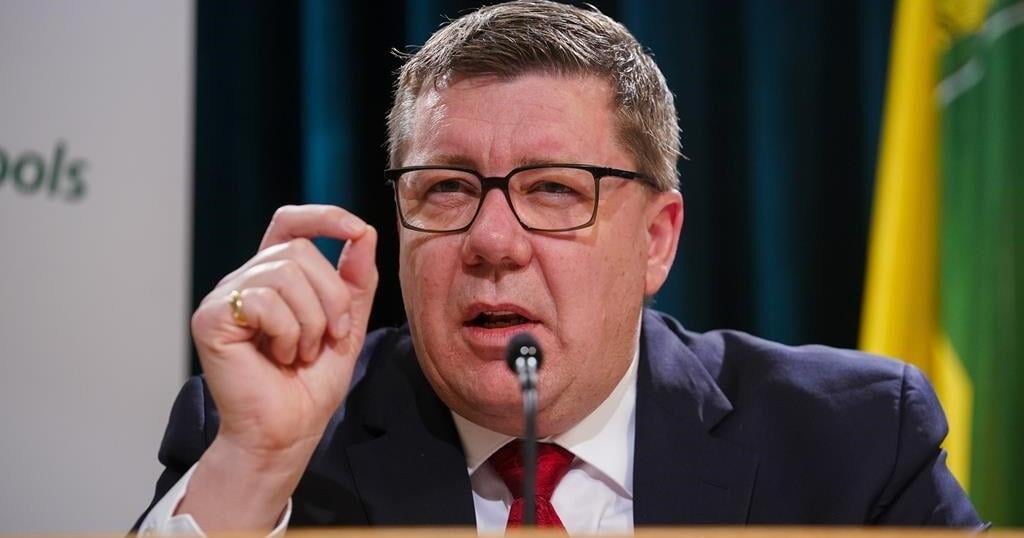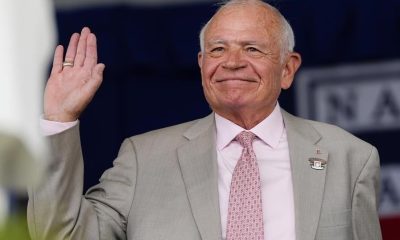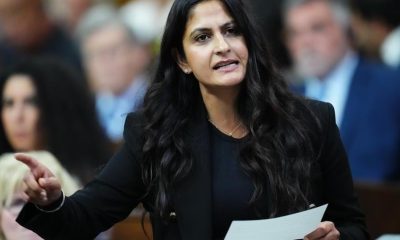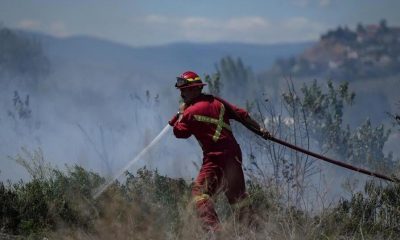A strike by WestJet plane mechanics forced the airline to tcanel hundreds more flights on Sunday, upending the plans of roughly 110,000 travellers over the Canada Day long weekend and prompting the carrier to demand action from the federal government.
Some 680 workers, whose daily inspections and repairs are essential to airline operations, walked off the job on Friday evening despite a directive for binding arbitration from the labour minister.
“WestJet is in receipt of a binding arbitration order and awaits urgent clarity from the government that a strike and arbitration cannot exist simultaneously; this is something they have committed to address and like all Canadians we are waiting,” WestJet Airlines president Diederik Pen said in a release Sunday.
Since Thursday, WestJet has cancelled 829 flights scheduled to fly between then and Monday — the busiest travel weekend of the season — the carrier said.
The vast majority of Sunday’s trips were called off as WestJet pared down its 180-plane fleet to 32 active aircraft and topped the global list for cancellations among major airlines over the weekend.
Trevor Temple-Murray was one of thousands of customers scrambling to rebook after their trips were scrapped less than a day in advance.
“We’ll just have to wait it out,” said the resident of Lethbridge, Alta., who was on hold in the parking lot of the Victoria airport trying to get a plane to Calgary, his wife and two-year-old son beside him in the car.
Their 6:05 p.m. flight had been cancelled, and they wouldn’t know until the evening whether a scheduled 7 a.m. flight the next day would go ahead.
“There are a lot of angry people in there,” Temple-Murray said, pointing at the terminal.
Nearby, Grade 10 exchange student Marina Cebrian said she was supposed to be back home in Spain early Sunday, but now won’t return to her family until Tuesday after enduring three flight cancellations.
“It’s distressing,” she said. “I was supposed to be at home today, like seven hours ago, but I’m not.”
Both WestJet and the Airplane Mechanics Fraternal Association have accused the other side of refusing to negotiate in good faith.
The airline’s president has stressed what he calls the “continued reckless actions” of a union making “blatant efforts” to disrupt Canadians’ travel plans, while the association claimed the Calgary-based company has refused to respond to its latest counterproposal. In an update to members Sunday, it said mechanics were “the victim of WestJet’s virulent PR campaign that you are scofflaws,” citing “calumnies” against workers around their right to strike.
The job action comes after union members voted overwhelmingly to reject a tentative deal from WestJet in mid-June and following two weeks of tense talks between the two parties.
As the clock ticked down toward a Friday strike deadline, the impasse prompted Labour Minister Seamus O’Regan to step in, mandating that the airline and union undertake binding arbitration headed by the country’s labour tribunal.
That process typically sidesteps a work stoppage. WestJet clearly thought so, stating the union had “confirmed they will abide by the direction.”
“Given this, a strike or lockout will not occur, and the airline will no longer proceed in cancelling flights,” the airline said Thursday.
The mechanics took a different view. The union negotiating committee said it would “comply with the minister’s order and directs its members to refrain from any unlawful job action.” Less than 24 hours later, workers were on the picket lines.
A decision from the Canada Industrial Relations Board seemed to affirm the legality of their actions regardless of protocols around arbitration.
“The board finds that the ministerial referral does not have the effect of suspending the right to strike or lockout,” the tribunal wrote Friday.
O’Regan said the next day the board’s ruling was “clearly inconsistent” with the direction he provided, but later added he respected the body’s independence. He met with both sides Saturday evening.
“I told them they needed to work together with the Canada Industrial Relations Board to resolve their differences and get their first agreement done,” he said in a social media post, appearing to put the onus on the parties.
However, O’Regan has broad authority under the Canada Labour Code. Though his initial directive to the tribunal for binding arbitration may have presumed a strike was off the table due to precedent, the labour minister could take a range of steps to “secure industrial peace and to promote conditions favourable to the settlement of industrial disputes,” the legislation states.
“To those ends the minister may … direct the board to do such things as the minister deems necessary.”
Both parties were set to meet Sunday, the union said.
“It’s uncharted territory. We’re breaking a new precedent here,” Ian Evershed, a mechanic and union representative involved in the talks, said of the simultaneous strike and arbitration.
The union’s goal remains a deal hammered out through bargaining rather than by an arbitrator — a route it opposed from the get-go.
“That process could take months to go through,” he said in a phone interview, stressing a strike puts pressure on the employer. That stance clashes with the WestJet president’s reiteration Sunday that the job action “serves no purpose other than to inflict maximum damage to our airline and the country.”
In a submission to the tribunal last week, WestJet lawyers said the union sought “an unreasonable and extortionate outcome” and intentionally manoeuvred to place the strike date at the height of summer travel.
The union says its demands around wages would cost WestJet less than $8 million beyond what the company has offered for the first year of the collective agreement — the first contract between the two sides. It has acknowledged the gains would surpass compensation for industry colleagues across Canada and sit more on par with U.S. counterparts.
WestJet says it has offered a 12.5 per cent wage hike in the first year of the contract, and a compounded wage increase of 23 per cent over the rest of the five-and-a-half-year term.
Meanwhile, travellers continue to scramble.
Sergio Arizmendi, a Grade 11 exchange student from Mexico, said he was booked to fly from Victoria to Phoenix and then drive to his home south of the border, but he now plans to take a ferry to Vancouver and then hop an Air Canada flight to Arizona, returning to his family two days late.
“My parents, they’ve been fighting with the airline,” said Arizimendi, who was hauling three large suitcases and a backpack.
Not everyone was vexed by the weekend’s labour turbulence.
“We are seeing a huge surge in bookings, presumably from passengers scrambling to save their long weekends,” said Flair Airlines spokeswoman Kim Bowie.
This report by The Canadian Press was first published June 30, 2024.

